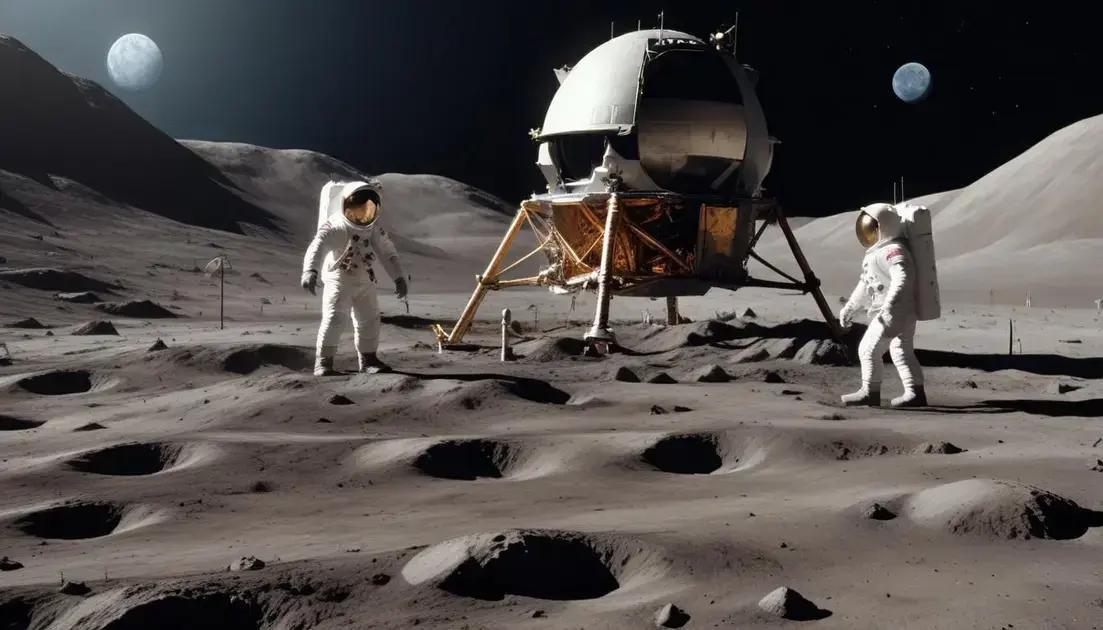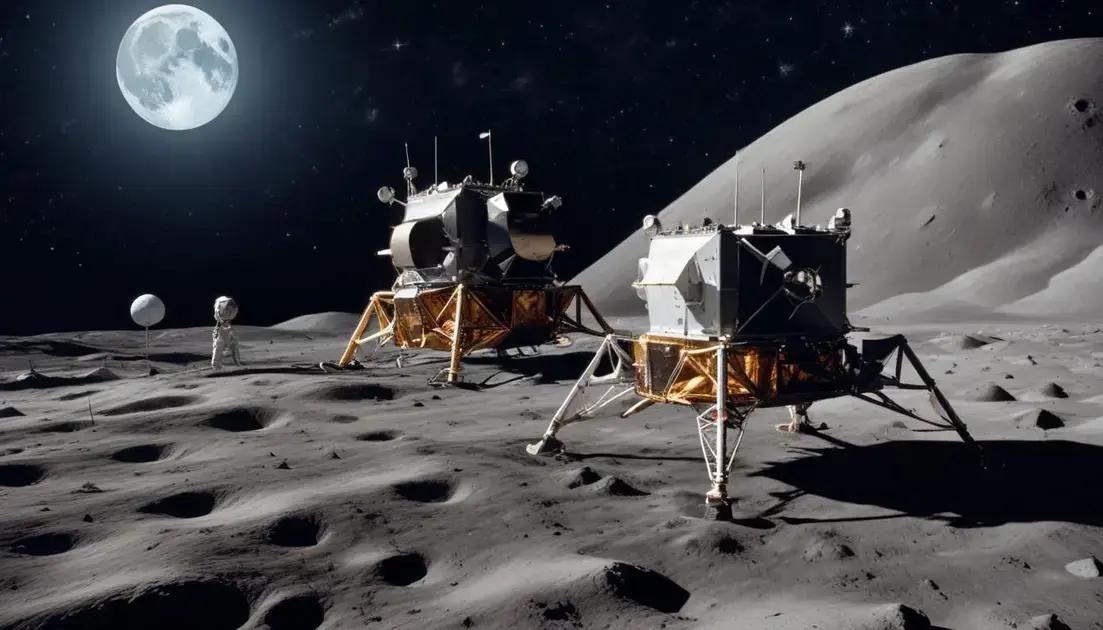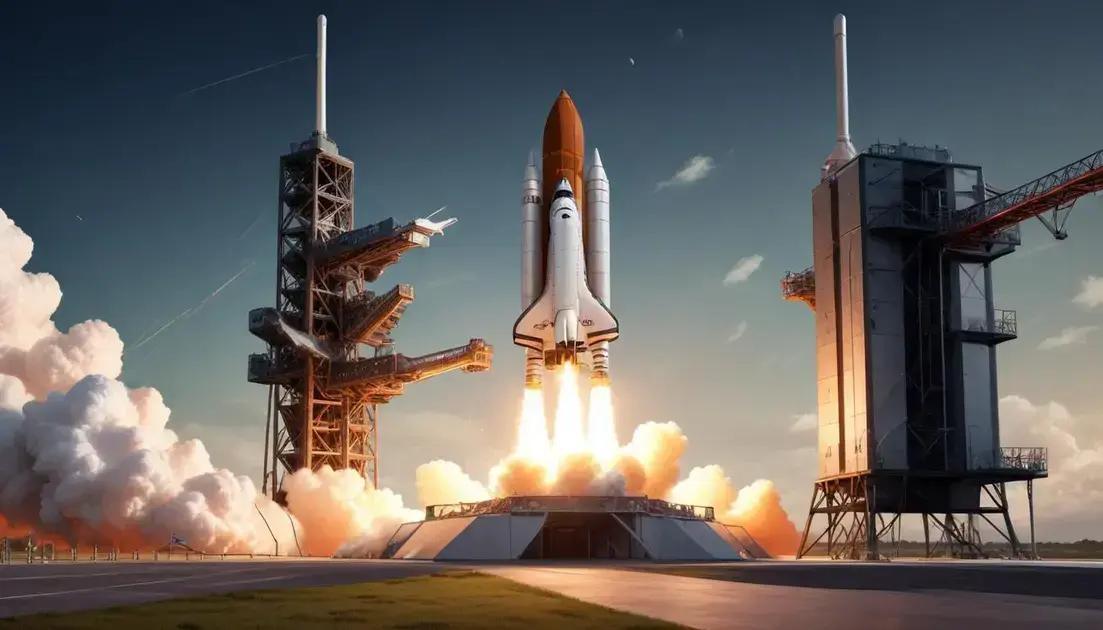
Apollo 11: “One Small Step” and Its Global Legacy
The Apollo 11 mission marked a significant milestone in human history by landing the first astronauts, Neil Armstrong and Buzz Aldrin, on the Moon in 1969. This event inspired generations, advanced technology, and transformed cultural perspectives on space exploration. Future missions, such as NASA’s Artemis program and commercial space travel initiatives, aim to expand our reach beyond Earth, including potential manned trips to Mars and asteroid mining. The legacy of Apollo 11 continues to ignite interest in science and exploration, shaping our understanding of the universe.
Apollo 11 was not just a mission; it was a transformative event that forever changed humanity’s relationship with space. Have you ever wondered how this one mission influenced technology and culture around the world?
The historic launch of Apollo 11
The launch of Apollo 11 was a moment for the history books. On July 16, 1969, NASA put the mighty Saturn V rocket into action. This rocket was huge and powerful, designed to carry astronauts to the Moon. A crowd gathered at the Kennedy Space Center in Florida, filled with excitement and anticipation. People from all over the world watched the incredible event.
The Saturn V Rocket
The Saturn V was a marvel of engineering. It stood 363 feet tall, taller than a 36-story building! This rocket had three stages, which helped it break free from Earth’s gravity. Each stage played an important role in sending the astronauts on their journey. The first stage lifted the rocket off the ground, while the second stage sent it into space.
The Astronauts on Board
Three brave men flew Apollo 11: Neil Armstrong, Buzz Aldrin, and Michael Collins. They were trained for years to complete this mission. Neil and Buzz were the first astronauts to walk on the Moon, while Michael stayed in orbit aboard the Command Module.
Countdown to Launch
The countdown began, and every second felt like an eternity. Everyone held their breath until the big moment arrived. With the roar of engines, Apollo 11 lifted off, marking the beginning of an incredible adventure.
As the rocket headed into the sky, cheers filled the air. People felt proud and hopeful. It was a shared moment of triumph for humanity, showing what we could achieve through teamwork and determination.
Neil Armstrong’s moon landing
On July 20, 1969, Neil Armstrong made a historic step. He became the first human to walk on the Moon. As he stepped onto the lunar surface, he said, “That’s one small step for man, one giant leap for mankind.” His words echoed around the world and inspired millions.
The Lunar Module
The Lunar Module, called “Eagle,” separated from the Command Module. Neil and Buzz Aldrin piloted it down to the Moon’s surface. It landed in an area called the Sea of Tranquility. This spot was chosen for its flat terrain and safety.
Exploring the Moon
After landing, Neil and Buzz put on their space suits. They checked their equipment and opened the hatch. Once outside, they explored the Moon’s surface. They collected samples of lunar soil and rocks. These samples taught scientists about the Moon’s history.
The Importance of the Moon Landing
This moon landing showed what people could achieve through hard work. It was more than just a space mission; it was a symbol of human curiosity and courage. Armstrong and Aldrin’s journey pushed the boundaries of exploration.
The success of Apollo 11 proved that technology could take us beyond our planet. It fired up dreams of space exploration for future generations.
Technological advancements from the mission
The Apollo 11 mission wasn’t just about landing on the Moon. It also brought amazing technological advancements that changed life on Earth. Engineers developed new systems and tools to handle the challenges of space travel.
New Materials
One major advancement was the creation of new materials. These materials had to be lightweight but strong. They were used in spacesuits and spacecraft. Today, we still see these materials in sports equipment and safety gear.
Computing Technology
Apollo 11 also pushed computer technology forward. The onboard computer used in the Lunar Module helped with navigation. This compact computer was one of the first to use real-time programming. It laid groundwork for modern computers.
Communication Innovations
Communication technology improved too. Engineers created systems that allowed for clear signals even from the Moon. The technology used helped develop satellite communication. Today, we benefit from these systems in our mobile phones and broadcasting.
Medical Advances
In addition, the mission led to medical advancements. Techniques for monitoring astronauts’ health were developed. These methods are now used in hospitals to monitor patients.
Overall, the Apollo 11 mission helped make significant progress in various fields. It showed how challenges can spark innovation, leading to improvements we use every day.
Cultural impact and legacy
The Apollo 11 mission changed culture in ways we still feel today. When Neil Armstrong and Buzz Aldrin landed on the Moon, they inspired people around the world. Their achievement showed what humans could accomplish.
Inspiring Generations
Apollo 11 inspired many to dream big. Countless kids grew up wanting to be astronauts or scientists. Schools started new programs focused on space and science. Curiosity about the universe skyrocketed.
Art and Music
The mission also influenced art and music. Many songs, paintings, and films focused on space exploration. Apollo 11 sparked creativity and imagination. Artists wanted to capture this historic moment.
Global Unity
The Moon landing united people around the globe. Major news outlets broadcast the event. Families gathered to watch together. It reminded everyone that we share this planet and can achieve great things when we work together.
Advances in Education
As a result of the mission, education in science and technology improved. Schools placed a stronger focus on STEM subjects. This push helped many students pursue careers in engineering and technology. The legacy of Apollo 11 continues to motivate young minds.
In short, the cultural impact of Apollo 11 is immense. Its legacy lives on in our dreams and aspirations, shaping the future.
The future of space exploration
The future of space exploration looks bright and exciting. Thanks to missions like Apollo 11, we’ve learned so much about the universe. New technologies continue to emerge, making space travel safer and more efficient.
Returning to the Moon
NASA plans to return to the Moon in the next few years. The Artemis program aims to land humans on the lunar surface again. This mission will help us learn more about the Moon and prepare for Mars.
Exploring Mars
Speaking of Mars, many missions are focused on the Red Planet. Rovers like Perseverance are already studying its surface. Future manned missions could take astronauts to Mars by the 2030s. This would be a major step in space exploration.
Mining Asteroids
Asteroid mining is another exciting possibility. These space rocks can contain precious metals and resources. Mining them could provide materials for building and fuel for spacecraft.
Commercial Space Travel
Commercial space travel is becoming a reality. Companies like SpaceX and Blue Origin are working on ways to bring tourists into space. This could change how we think about travel and exploration.
In short, the future of space exploration is full of potential. With dedicated teams and innovative technologies, humanity is ready to reach new heights.
Conclusion
In conclusion, the journey of Apollo 11 and its impact on space exploration is just the beginning. As we look to the future, technologies that will allow us to return to the Moon and explore Mars play an important role in our growth as a species. Missions like Artemis and commercial space travel are opening doors to new adventures.
We’ve already seen how Apollo 11 inspired generations and sparked curiosity. Now, with ongoing advancements, we remain on the brink of amazing discoveries. The possibilities of mining asteroids and sending humans to Mars will shape our understanding of the universe.
As we embrace these efforts, it’s clear that our ability to explore space can lead to new innovations right here on Earth. The legacy of Apollo 11 continues to guide us, reminding us that together, we can achieve the extraordinary.


